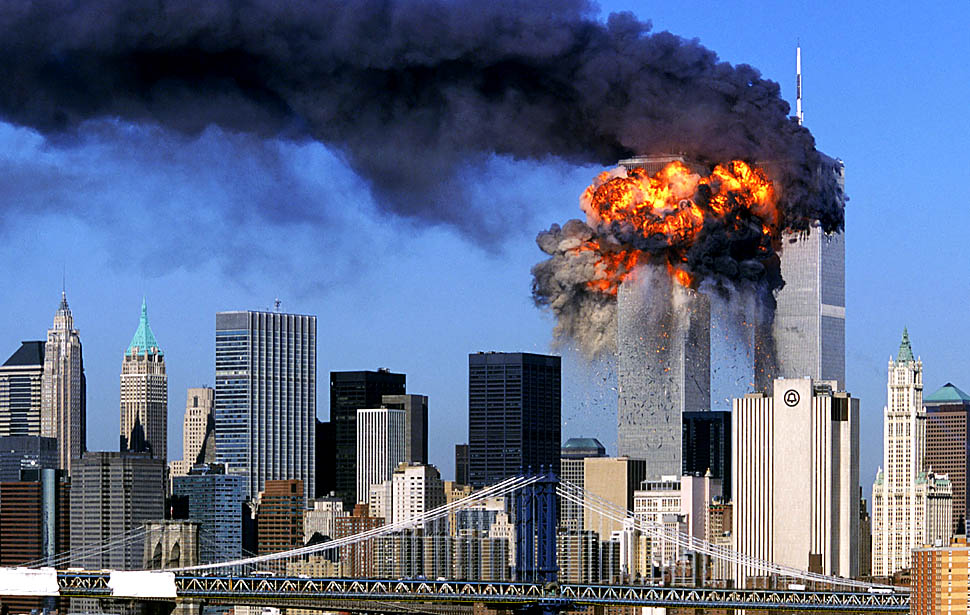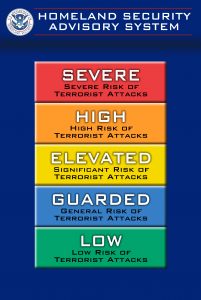Attack on the Twin Towers, NYC.
Understanding and Navigating a Landscape of Change:
The aftermath of a tragedy is just as significant as the event itself. The responses, whether planned or unplanned, may seem instantaneous and in the moment; however, they ultimately shape the future. The tragedy sets the tone for the next decades to come and the events on 9/11 were a defining moment for a generation.
Immediate Aftermath: New Beginning
During and post-tragedy, the news reels around the country devoted themselves to near-constant coverage of the 4 hijackings. The updates, eye-whitnesses, and complete coverage across all mediums reached a fever-pitch and even non-traditional programing took the time to become another voice to rely news. The need for full-disclosure also involved some new decisions.
Clear Channel Communications, the largest owner of AM and FM radtio stations in the United States, in the wake of the September 11th attacks allegedly issued a list to be distributed to its radio stations. The alleged list reportedly consisted of songs that were advised to be “considered before play”. The songs were chosen based upon “lyrically inappropriate content”, which is vague enough to result in some rather harmless songs being “banned”. The list was created by one of the programme directors and senior exectives of the company and was said to have distributed to the network’s 1,200 radio stations. The suggestions of songs to not be played totaled around 160 selections and spanned a number of genres.
“Given the environment, a Clear Channel program director took it upon himself to indentify a number of songs that certain markets or individuals may find insensitive today”, the company said in a statement. “This was not a mandate, nor was the list generated out of the coporate radio offices. It was a grassroots effort that was apparently circulated among programme directors.”
The alleged list of songs included all songs by Rage Against the Machine as well as songs recorded by multiple artists. The songs typically involved either lyrically questionable references to death, fire, bombs, criminals, destruction, and violence. However, there were some rather harmless and obscure choices as well.
Examples from the list include:
- “Bad Religon” – Godsmack
- “Brain Stew” – Green Day
- “He Ain’t Heavy, He’s My Brother” – the Hollies
- “Sabatoge” – Beastie Boys
- “Falling for the First Time” – Barenaked Ladies
- Multiple songs by Alice in Chains, AC/DC, the Beatles, Metallica, and Elton John.
- “In the Air Tonight” – Phil Colins
- “What a Wonderful World” – Louis Armstrong
The list tended to focus mostly on rock-genres, including heavy metal, hard rock, and pop rock with several folk songs. The reasoning behind several pop song selections was often unclear, which lends to the question of how effective these suggestions were.
The “banning” foretold of a kind of censorship that rather than helped, instead resutled in much harm to the American public. Deciding for the people what was best took on a dark tone in tragedy’s wake. This seemingly routine, perhaps insignificant instance set the tone for a future involving questionable choices in the name of security.
Addionally, the company has since been rebranded as iHeartCommunications, Inc. or more commonly known as iHeartRadio.
The response of the media was certainly at the forfront of the attack due to the essential coverage required to assess the scope of this tragedy. The actions of the government, caught off guard by this tragedy were also as equally watched. The response needed to be a call for unity and strength while grieving for such a loss.
At 7:45PM on the day of the attack, the first public musical reaction occurred on the steps outside of the Capitol building. After an address by Senator Majority Leader Dennis Hastert and then House Speaker Tom Daschle, and a moment of silence, members of Congress spontaneously began singing “God Bless America”.
The song “God Bless America” has a long history within American culture with strong political and religious signifcance. A patiriotic song written by Irving Berlin in 1918 with a later revision in 1938, the choice of this song was important. It was emotionaly charged and the song was powerful, calling for unity from a group that were so recently divided in partison battles over U.S. policies.
The religious message within it was in contrast with that intent of those who committed harm. A call for faith to withstand the destruction raught.
“God Bless America” became a common feature during the early period after 9/11. It was coupled with the tremendous increase in patriotism, faith and its displays during the post 9/11 era.
Bush Administration: Is there a “Good Guy” in this?
During a time of crisis, people turn to a leader for both pragmatic reasons as well as psychological ones. In the aftermath of 9/11, the president and his administration were elevated to a level of importance that had not been experienced in a long time.
President George W. Bush had been sworn in January, 2001 and thus, was not even a year into his term. Prior to the terrorist attacks and the other colmonating events on that day, he had an approval rating, according to Gallup Polls, of around 50% via the American public. This approval rating recevied a tremendous boost to a high of 90% a few weeks past 9/11.
Unfortunately, the administration leaders of the time while presenting a strong front, calling for retribution and for action quickly turned into less than noble actions all in the name of protection. The “Axis of Evil” that Bush often referenced regarding abroad targets in conflict at first resonated with a call-back to WWII-a sense of justice and validation-which later collapsed into bitter wars with no resolution. Bush and his administration would be viewed as leaders and as betrayers within a short span of time. Seemingly rightous goals given way to beaurcratic and worthless entanglements.
By the time Bush was soon to leave office in 2008, he had apprval ratings as low as 25%, which demonstated the contrast between Americans’ needs and feelings post-tragedy compared near 10 years past.
War: What is it Good for?
In response to the desvestating attack, President Bush insists upon retirbutuion for the lives lost and declares war on terrorism. Those still reeling from the tragedy, the whole of America at this point felt it
However, in declaring war there was the loss of important limitations that later led to horrific attrocities being committed in the name of national security.
Congress authorized Bush to use:
“All necessary and appropriate force against these nations, organizations, or persons he determines planned, authorized, commited, or aided the toerrist attacks that occurred on September 11, or harbored such orgaizations or persons in order to prevent any future acts of of international terrorism against the United States by such nations, organizations, or persons.”
A call for retaliation is understandable considering the nature of the attack that harmed so many; yet, the reasoning behind many actions taken did not condone their extent. The creation of the Department of Homeland Security signaled an intense focus on domestic security and future clashes with free speech.
The war in Afghanistan began October 7, 2001 with the United States and a coalition force launching Operation Enduring Freedom in the Taliban-controlled state. It had provided a safe heave for the al-Qaeda leaders who plotted the attacks against not just America, but the rest of the Western world. Among these leaders was Osama bin Laden.
The war in Iraq was another international conflict, spurned by the Iraqi presidental dicatator Saddam Hussein, a man called “evil” by President Bush. Claims of Iraq developing weapons of mass destruction (WBDs), later declared false, drove this need for a second war. These wars came with an ever extending-occupation.
The deaths of innocents, the torture of detainees to receive useless intel, if any, and the incrasingly worrying loss of citizens’ privacy in addition to the continuence of terror across the globe, whether by bombs or anthrax.
President Bush declared,
“You can’t distinguish between al-Qaeda and Saddam Hussein when you talk about the war on terror.”
This claim was later proved false as neither had ties with the other. Another way misinformation furthered wars with seemingly no end.
What first seemed like retribution had become muddled and sour with new enemies as well as the old at the cost of thousands of lives halfway across the world.
Home front: Manipulation, Protection, and Overhaul
The environment created in the wake of social upheaval due to emotional turmoil and politcal change resulted in the American public undergoing temaltuous change.
National security became color-coded terror alerts on the news called the Homeland Security Advisory System.
There were other attacks and fears, steming from the antrax and concerns abroad as protocall seemed to be abandoned. There was the PATRIOT Act which stood for “Uniting and Strengthening America by Providing Appropriate Tools Required to Intercept and Obstruct Terrorism”. It greatly expands domestic law enforcement capacity for conduction of surveillance and wiretaps as well as further increased presidential powers during a terrorist attack. The invasion of privacy did not end there. Survelliance by the NSA, although the extent was not known until more recent years, between the United States and overseas persons was allowed and a second Patriot Act was passed to further expand control. Prisoners and detainees were not treated according the code of the Geneva Convention either as thousands of American soldiers and international help put themselves in the line of fire. All of these events were a shock to the system, one already in mourning. The plathora of personal emotions and the growing discontent over government actions manifested in a time of emotive music that resonated with the public during this life-altering time.

